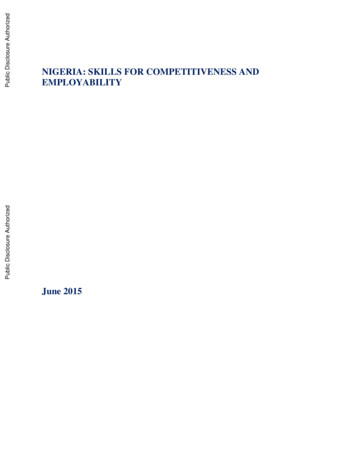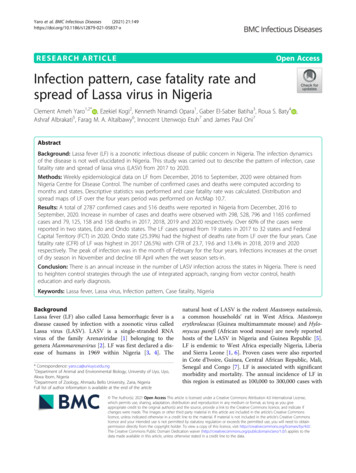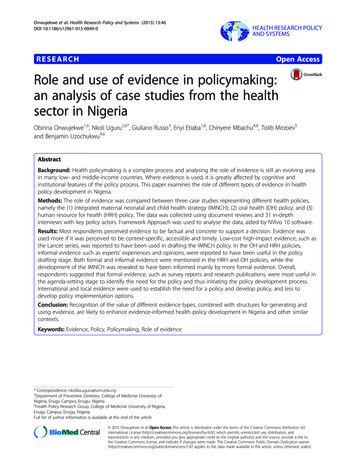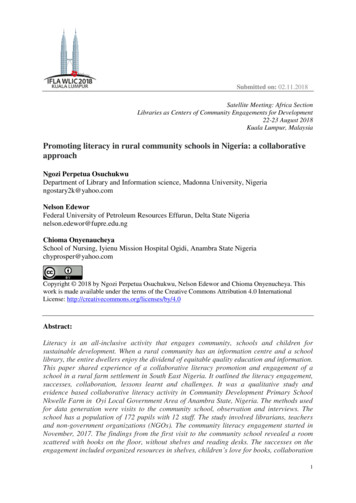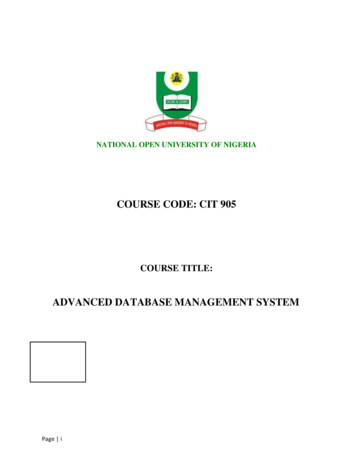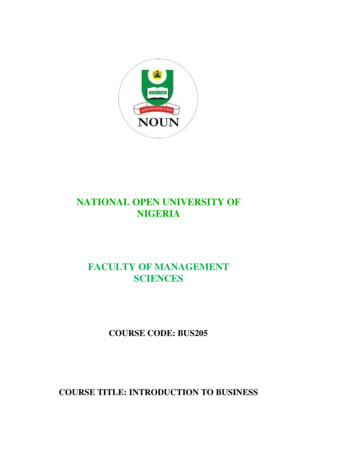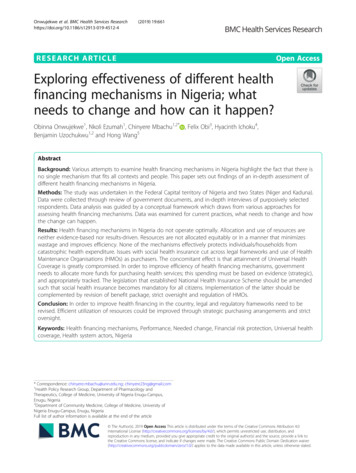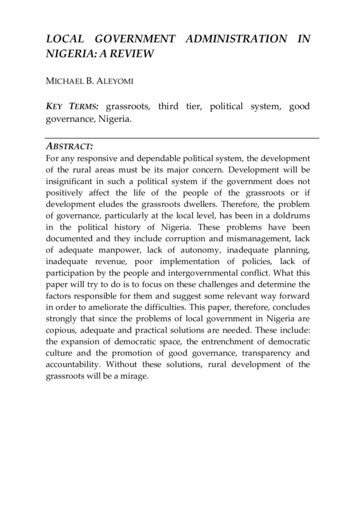
Transcription
LOCAL GOVERNMENT ADMINISTRATION INNIGERIA: A REVIEWMICHAEL B. ALEYOMIKEY TERMS: grassroots, third tier, political system, goodgovernance, Nigeria.ABSTRACT:For any responsive and dependable political system, the developmentof the rural areas must be its major concern. Development will beinsignificant in such a political system if the government does notpositively affect the life of the people of the grassroots or ifdevelopment eludes the grassroots dwellers. Therefore, the problemof governance, particularly at the local level, has been in a doldrumsin the political history of Nigeria. These problems have beendocumented and they include corruption and mismanagement, lackof adequate manpower, lack of autonomy, inadequate planning,inadequate revenue, poor implementation of policies, lack ofparticipation by the people and intergovernmental conflict. What thispaper will try to do is to focus on these challenges and determine thefactors responsible for them and suggest some relevant way forwardin order to ameliorate the difficulties. This paper, therefore, concludesstrongly that since the problems of local government in Nigeria arecopious, adequate and practical solutions are needed. These include:the expansion of democratic space, the entrenchment of democraticculture and the promotion of good governance, transparency andaccountability. Without these solutions, rural development of thegrassroots will be a mirage.
AFRICANAMARCH 2013INTRODUCTIONThe importance of the creation of local government anywhere in theworld reveals the need to aid development at the grassroots. Theestablishment of such areas is geared to play vital social, political andeconomic roles for the overall development of the country. Therealization of this important fact coupled with the desire to bring thegovernment nearer to the people (most especially people in the ruralareas) has prompted the Federal Government of Nigeria to introducea number of significant reform measures to local governmentadministration, particularly since 1976. The local government reformsof that year made some fundamental changes in the structure,functions and finances of local government cum useful points ofreference for successive governments for subsequent reformprogrammes that have been introduced in Nigeria. The 1976 reformsclearly defined the power and functions of local government andmade them the third tier of government with enhanced prestige andresponsibilities. The purpose of the reforms was to bring about thedevelopment of the rural areas.However, the increased responsibilities of local governmentsin recent times seem not to be adequately matched by their financialresources. This has been manifested in the inability of most–if not allof them—to perform satisfactorily in their new tasks such as theestablishment and payment of primary schools, teaching and nonteaching staff, provision of primary health care, and building of roads.It is now 36 years since its promulgation. As important as this tier ofgovernment has been, there seem to be some hurdles that have tamedits performance and functions in recent times. These problems involvethe undue interference of federal and state governments (which ispolitical in nature), bribery and corruption, and ill-trained andunqualified personnel to mention a few.VOL. 6, NO. 234
AFRICANAMARCH 2013THE CONCEPT OF LOCAL GOVERNMENTConceptualizing local government, like others in the social sciences, isnot easy; it is difficult to have a universally acceptable definition forthis concept in developing and developed countries of the world.Consequently, Ovwasa (1995) has opined that the meaning attachedto local government varies from country to country and, morefrequently, it has become the purpose for which local government iscreated. However, the concept of local government involves aphilosophical commitment to democratic participation in thegoverning process at the grassroots level. This implies legal andadministrative decentralization of authority, power and personnel bya higher level of government to a community with a will of its own,performing specific functions as within the wider national framework.A local government is, at the grassroots level of administration, meantfor meeting the peculiar needs of the people (Agagu, 1997:18).Appadorai (1975:287) sees local government as government by thepopularly elected bodies charged with administrative and executiveduties in matters concerning the inhabitants of a particular district orplace.Local or grassroots government may be defined as havingbeen established by law to perform specific functions within definedareas. A complex nation like Nigeria, with its many ethnic groupswithin a divergent and diverse culture, requires a high degree ofdecentralization, which they accomplish by creating local governmentauthorities. Looking at the existence and relevance of localgovernment, Ayo (2005) believes that local government is a territorialnon-sovereign community possessing the right level of necessaryorganization to regulate its own affairs. Local government can beviewed as a legal personality with sufficient but limited powers ofcontrol over its staff, finances and funds (Amao, 2002).Arising from our observation above, many definitions of localgovernment have been suggested by different authors. As OvwasaVOL. 6, NO. 235
AFRICANAMARCH 2013(2004) analyzed elsewhere, local government has been defined as asubdivision of a nation (unitary country) and state (federal system)which has substantial authority to extract labour and impose tax overits jurisdiction. The council of such local government is constituted bylaw, and membership is either elected or selected. Ovwasasummarized the definitions of local government with the followingobservations:i.Local government is created by lawii.It has a representative governmentiii.It is a lower level of government and it has a legalpersonality with the power to impose taxes in its areas ofjurisdiction or competence, but with limited autonomy.Local governments, at least in principle, deal with grassrootspolitics, i.e. keeping law and order, basic sanitation, constructing andmaintaining local roads, supplying water, administering local schools,providing skill training and employment for residents, et cetera.However, community development is the process or effort of buildingcommunities on a local level with emphasis on building the economy,forging and strengthening social ties, and developing the non-profitsector. These are aimed at improving the quality of life of the peoplein the community. Are local government administrators in Nigeriaperforming their functions? If not, what are the obstacles? Before wedelve into the problems of local government, let us attempt to look atits evolution in order to foster our understanding of the salient issuesbeing raised in this paper.EVOLUTION OF LOCAL GOVERNMENT SYSTEMS IN NIGERIAThe history of local government systems in Nigeria dates back tocolonial days. The name, structure and composition have experienceddifferent changes over the years. During the 1930s and 1940s, forVOL. 6, NO. 236
AFRICANAMARCH 2013instance, local government was known as chief-in-council and chiefand-council, where traditional rulers were given pride of place in thescheme of things. In the 1950s, elections were introduced according tothe British model in the western and eastern parts of the country withsome measure of autonomy in personnel, financial and generaladministration (Nwabueze, 1982:20-21). It was on this premise thatthe rising tide of progress, growth and development experienced inthe local governments in these areas was based. The pace of thisdevelopment was more noticeable in the south than in the north.During this period, heterogeneity was the hallmark of localgovernment as there was no uniformity in the system and the level ofdevelopment was also remarkably different. The introduction of the1976 reforms by the military administration of General Obasanjobrought about uniformity in the administrative structure of thesystem. The reforms introduced a multi-purpose single-tier localgovernment system (Ajayi, 2000:70). Efficient systems of nativeadministration had existed in the various parts of Nigeria before thecoming of the Europeans (Olatunbosun 1998). This was particularlythe case in the northern and western parts of Nigeria, where theexisting systems of traditional administration provided the colonialauthorities with a much-needed workable basis for introducing theindirect rule system of governance, first in the Northern Protectorateand later in the Southern Protectorate.Between 1900 and 1950, the Nigerian colonial authoritiesconsisted mainly of traditional office holders whose main functions,according to Kareem (2005), were to maintain law and order andgenerally act as agents for the colonial government by providingcertain basic services in their respective localities. With the pressuregenerated by the nationalist struggle for democratization and self-rulethat emerged in the 1950s, more modern local government councilswith elected members increased responsibilities and enhancedfinancial status. However, the local government councils suffered aVOL. 6, NO. 237
AFRICANAMARCH 2013decline in status in the 1960s and early 1970s due to their inability toperform their functions up to expectation. Since 1976, however, anumber of reforms have been introduced at the national level with theobjective of transforming a local government into a separate tier, withclearly defined and enhanced responsibility, improved financial alrearrangements.The beginning of the democratization of local governmentadministration with the introduction of non-traditional elected orselected members can be traced back to the 1950s. The electedmembers constituted about seventy-five percent of the councilmembership. However, according to William (1994), the militarygovernment dissolved all the elected members in 1966 and theirfunctions were taken over by councilors, some nominated by therespective military governors and some by traditional rulers. By 1975,the number of local government authorities in eight states (excludingthe four states in the east and mid-west) was 113 and later increasedto 301; in 1988 it rose to 442. Due to more agitation, it increased to 454in 1989 and then 589 in 1991. Following the state creation in 1996, localgovernment is presently 774 including the FCT.(Kareem 2005). Nopublic institution in Nigeria has been so subjected to frequent reformsthan local government. Almost all successive administrations inNigeria introduce one administrative change or another. Apart fromthe celebrated 1976 reforms, state government officials have alsointroduced various manipulations. For instance, in Ekiti state, thetenure of elected local government officials was reduced to two years,while some three years. In the southwest, except for Lagos, a caretakercommittee was introduced in 2003 immediately after the generalelections. In a similar vein in June 2007, some state governmentsdissolved their local councils and appointed caretaker committees tosteer the affairs of the council prior to the conduct of elections. In July2011, the Kogi State government dissolved the elected localgovernment chairmen and directed all the DLGs to take over theVOL. 6, NO. 238
AFRICANAMARCH 2013affairs. In essence, it has become almost fashionable in Nigeria for anincumbent administration to introduce one change or another in theinstitution. So far the local government system in Nigeria has not beenstable and thus its future remains bleak, uncertain and insecure.What are the reasons for the creation of local government inNigeria?Many reasons, ranging from the political to the socio-economic, havebeen given for the creation of local government. . These reasons havebeen captured by section 7(2) of the 1999 Constitution (as amended)by the following words:The person authorized by law to prescribe the area overwhich a local government council may exercise authorityshall:(1) Define such an area as clearly as practicable(2) Ensure, to the extent to which it may bereasonably justifiable, that, in defining such areas,attention is paid to: the common interest of the community in the area the traditional association of the community, and its administrative convenience.In summary, the following are the purposes for the creation oflocal governments:1. Grassroots participation in governanceOne of the major reasons for the creation of localgovernment in Nigeria is to bring governance closer tothe people. Participation by the citizens-in-governance isone of the underlying precepts of democracy and themodern notion of government. This is done throughVOL. 6, NO. 239
AFRICANAMARCH 2013participation in the electoral processes and decisionmaking in the local communities. For this reason, localgovernments also serve as political incubators forbudding politicians. They afford future leaders theopportunity to undergo political training (See section 7 ofthe Constitution of the Federal Republic of Nigeria 1999).2. Administrative convenienceLocal governments are created for administrativepracticality and suitability. There are many functions thatwill be cumbersome for the State and FederalGovernments to perform because of the distanceseparating them and the people. Such functions can bebest and effectively performed by the local government,e.g. collection of rates, radio and television licenses, andthe registration of births, deaths and marriages. Localgovernment is also created to serve as the presence of thefederal and state governments amongst the local peopleand as a channel through which policies arecommunicated and implemented.3. To provoke developmentLocal governments are created to bring about meaningfuldevelopment in the rural areas. As agents of ruraldevelopment, they are to use the funds made available tothem by both federal and state governments and theirinternally generated revenue to improve on the lives ofthe people within their areas of operation through thefollowing economic development in line with section7(3&4) of the Constitution:a. Initiating and attracting developmental projects to thelocal government such as provision of access roads, waterand rural electricity;VOL. 6, NO. 240
AFRICANAMARCH 2013b. Sustaining livelihoods through the provision of creditfacilities for agriculture, arts, crafts and small scalebusiness; andc. Encouraging the formations of cooperative societiesand other economic groupings.4. Preserve the heritage and common interest of the peopleThe creation of Local Government is intended to bring peopleof common heritage or ancestry together as a political unit tofurther their interest and increase their participation ingovernment business. In Nigeria today, there are over 250ethnic groups with diverse cultures and tongues. These ethnicgroups are further divided into communities. Thesecommunities form the constituents of most LocalGovernments in Nigeria. By carving out Local Governmentsamongst people of the same community, government ispreserving such long 'traditional association' and using sameto foster the interest of the people concerned.The Hurdles of Local Government in NigeriaAs we have rightly noted, the problems of local government inNigeria have been documented. These include inadequate planning,poor implementation of policies, inadequate revenue, corruption andmismanagement, lack of adequate manpower, lack of autonomy, lackof participation by the people and intergovernmental conflict(Adamolekun, 1983; Orewa, 1991). The history of local government inNigeria shows that there are problems of governance. Various effortshave been made by government to reform the system and increaseparticipation of the people. Despite these justifications, the third tierof government appears not to have justified the reasons for which itwas established; instead, it has been in the doldrums. Why has localgovernment failed in its expectations? How can these problems beVOL. 6, NO. 241
AFRICANAMARCH 2013addressed and solved? These concerns will be addressed in theremaining part of this paper.Financial ConstraintsAs much as the local governments may have rich programmes forexecution, the financial means of doing so is not present. Revenue isby far lower than what is required in many cases. The economic andfinancial profile of the local governments in Nigeria is very poorcompared to the developmental projects they are expected to carryout, despite the increase in the total amount of funds made to themsince the early 1990s. Here, the situation is connected to andexacerbated by a high rate of mismanagement and the embezzlementof these funds. The corrupt officials of these councils divert moneymeant for some projects to their personal purses.Shortage of Skilled Workers/PersonnelInadequacy of trained and skilled administrative, technical andprofessional personnel renders local governments in Nigeria, with theexception for some few in the southern states, ineffective andinefficient in the performance of their constitutional rights. Reasonsopined for this include the low image of local government in the mindof the professionals; questionable, subjective and sentimental mannersof recruitment cum low or no incentive; and the threats and fear ofretrenchment to junior workers, which has derailed theirpsychological balance and affected their efficiency and output.Lack of AutonomyUnnecessary political interference from state and federal governmentsis another constraint plaguing local government authorities inNigeria. There is a high level of external influence and intrusion inlocal affairs by other tiers of government, which is worrisome andneeds urgent attention. The future of local government is notguaranteed in a situation whereby the state governorVOL. 6, NO. 242
AFRICANAMARCH 2013unconstitutionally dissolves the elected council officer without anyprobe or investigations into false and bogus allegations. As a result,this level of government has a crisis of recognition and autonomy. Thequestion here is: Is local government truly the third tier ofgovernment, or a ministry under its respective state government? In atrue sense, local government in Nigeria lacks autonomous financialpower. It is now considered as an extension of the state's ministry.The inherent nature of this problem has caused subservience, asituation where local government waits for the next directives fromthe state government before the former can think of, let alone embarkon, developmental projects. Thus local government has been an objectof control and directives. As a result, square pegs are put into roundholes in appointments to posts, which are mainly based on politicalparty patronage.Laissez-Faire Attitude to Work and Wide-Range of IndisciplineThat the third tier of government has been tagged the home ofindiscipline is well pronounced among the workers. Little or nocommitment to duty has become the rule rather than an exception;this includes senior officers. Some may travel over the weekend andnot bother to return to work until Tuesday the following week, andthe junior ones are very carefree in the habit of truancy regardingtheir jobs. Offices have been turned to marketplaces where officershawk their goods freely. The rules that guide moral conduct andprofessional ethics seem to have been on sabbatical and at worstbecome a cobweb that is too weak to tame the monstrous activities ofthe workers. Indiscriminate lustful desires are noticeable among theworkers. Relationships between super-ordinates and subordinateshave been strained. Strict instructions handed down from the topechelon to the bottom are either not followed or treated with levity asa result of the immoral relationship between the boss andsubordinates. Official duties are seen as an extension of privateleisure. A laissez-faire attitude at work has arrested the efficiency oflocal government and has drastically affected its performance.VOL. 6, NO. 243
AFRICANAMARCH 2013Lack of Continuity by Succeeding GovernmentsOne of the problems facing local governments nationwide is the lackof continuity of government programmes and projects by succeedinggovernments. This disruption leads to economic and mental waste aswell as the retrogression of development. Projects are done notaccording to or as demanded by the people but, regrettably, in tunewith the selfish ends and aggrandizement of the political leadership incollaboration with the senior bureaucrats at the local governmentlevel of administration. Priorities are being misplaced.Problems of Participation and InvolvementFor over ten years, different terminologies have been used to justifypeople's participation at the grassroots level: "development frombelow," "bottom-up approach to development," "popularparticipation," “bringing government closer to the people," and othercatchphrases have been used to argue for people's involvement in theaffairs that directly affect them (Lawal, 2000:66). From all manner ofconvictions, we can observe that the involvement of people in theaffairs and running of local government in Nigeria is nonfigurativeand theoretical rather than active and practical. Local governmentprepares estimates for its revenues and expenditures withoutproperly consulting the people’s potential needs and problems.Different arguments have been put forward as to the responsibility fornon-involvement of people in their own affairs. These include: loss ofinterest in the projects that do not benefit the chairmen and theircohorts; the belief by the officials that people are ignorant, illiterateand unenlightened; and the lack of political will by the leadership torun an open administration due to their selfish interests coupled withthe poverty of socio-political philosophy for change.VOL. 6, NO. 244
AFRICANAMARCH 2013Prospects and a Way ForwardIn order to consolidate the gains made in local governance over theyears and to reposition it for greater performance, there is a need tosuggest a way forward and evaluate prospects. Unfortunately, localgovernments have demonstrated incompetence despite the basicrationale behind their creation: to meet the needs of the people at thegrassroots. It is therefore desirable to suggest ways through whichlocal governments can come out from this indolence and doldrum.First, local government, as a third-tier government, shouldnot be scrapped or changed to local administration; it should bestrengthened and democratized instead. Officials of the localgovernment should always be elected and not appointed.Second, there is the need to put a mechanism in place topromote transparency and accountability at all levels of governance.Statutory allocation of local government councils should be reviewedupward and inward, for the improvement of Internally GeneratedRevenue (IGR) and for self-financial reliance. In addition, promptrelease of allocations from federation accounts should be looked intoto avoid delay in executing council developmental projects. Localcouncils are also advised to look for ways of attracting industries totheir areas which will propel economic development, employmentand increase their revenue base. In this regard, it will be crucial tostrengthen institutions’ horizontal accountability and anti-corruptionbodies in order to build up the economic and revenue base of thecouncils. Civil society organizations, particularly at the local level,should be reoriented and empowered to hold elected officialsaccountable.Third, there is a great need to reform the structure ofgovernment at all levels. This will require a comprehensive review ofthe 1999 Constitution. For example, Section 7 of the 1999 Constitutionthat places local government under state government has made theVOL. 6, NO. 245
AFRICANAMARCH 2013former a mere appendage of the latter. Executive and legislativebodies should display the political will and commitment to reform the1999 Constitution, which has been criticized by all strands of society.The reform of the Constitution will address other issues that aregermane to good governance, such as party financing, campaignfinancing, and a proper electoral system.Fourth, local government should have total autonomy. Thiswill allow and guarantee its survival and provide it with remedies forthe problems highlighted above. There are good prospects forNigerian local government systems. These include: convenientgrassroots governance; quick execution of projects without thebottlenecks often encountered in getting approval from the state;provision of essential services to the public by the local governmentcouncils; and awareness of the community’s responsiveness andparticipation. By and large, there will be no bureaucracy with regardsto the release of funds for social services.Fifth, government should place a high premium on theparticipation of the people in all governance and development issues.Workers in local councils should be adequately motivated in order toprepare them for the task of service delivery. Workers occupyimportant positions in the production process in any organization.They are the ones that make things happen because they put life intoraw materials and change its form to satisfy human needs.Finally, the electorate should be educated and enlightened ofthe danger inherent in money politics. They should endeavour to votefor people of proven integrity rather than compromising their futureand that of generations unborn. It is the belief of this paper that strictobservance to these suggestions can lift local councils from theirrelegated position as tools of manipulation to the status ofinstruments of change and development at the grassroots level.VOL. 6, NO. 246
AFRICANAMARCH 2013REFERENCESAdamolekun, L. (1983) Public Administration: A Nigerian and ComparativePerspective. New York, Longman Inc.Ajayi, K. (2000) Theory and Practice of Local Government. Ado Ekiti, UNADAgagu, A. A. (1997) "Local Government" in Kolawole, D. (ed.) Readings in PoliticalScience, Ibadan, Dekaal.Amao, A. I. (2002) In Cole, A. “Introduction to Local Government” Oshogbo: StoneEdge PublisherAppadorai, A. (1975) The Substance of Politics. New Delhi, Oxford UniversityPress.Ayo, C. (2005) In Cole, A. “Local Government as a vehicle of sustainingDemocratic setting” Kogi Affairs Vol 4. No 17.Lawal, S. (2000) "Local Government Administration in Nigeria: A PracticalApproach" In Ajayi, K. (ed.) Theory and Practice of Local Government,Ado Ekiti, UNADNwabueze, B. O. (1982) A Constitutional History of Nigeria. London, Longman.Olatunbosun V. I. (1998) “the 1976 Local government Reforms”. In Ademolekun R.(ed.); The New Local Government System in Nigeria: Problems andProspect for Implementation. Ibadan: Heinemann Publisher.Orewa, G. O. (1991), Principle of Local Government. Lagos: Administrative StaffCollege of Nigeria (ASCON). Local Government Study Series, August.Kareem, M. B. (2005), “Local Government as a tool for the country’sDevelopment”. Journal of Politics Vol. 2Ovwasa, O. L. (1995), Local Government administration in Nigeria. Ibadan:Sunnad Publisher.Ovwasa, O. L. (2004), Theory and Practice of Local Government. POS 218 ReadingMaterial University of Ilorin: Ilorin.William, O. (1994), In Akpan, N. U. Epitaph to Indirect Rule: A Discourse on LocalGovernment in Africa. London: Frank Grass and Company Limited.The 1976 Local Government Reforms guidelines, Lagos, Federal Ministry ofInformationThe Constitution of the Federal Republic of Nigeria 1999.VOL. 6, NO. 247
performing specific functions as within the wider national framework. A local government is, at the grassroots level of administration, meant for meeting the peculiar needs of the people (Agagu, 1997:18). Appadorai (1975:287) sees local government as government by the
